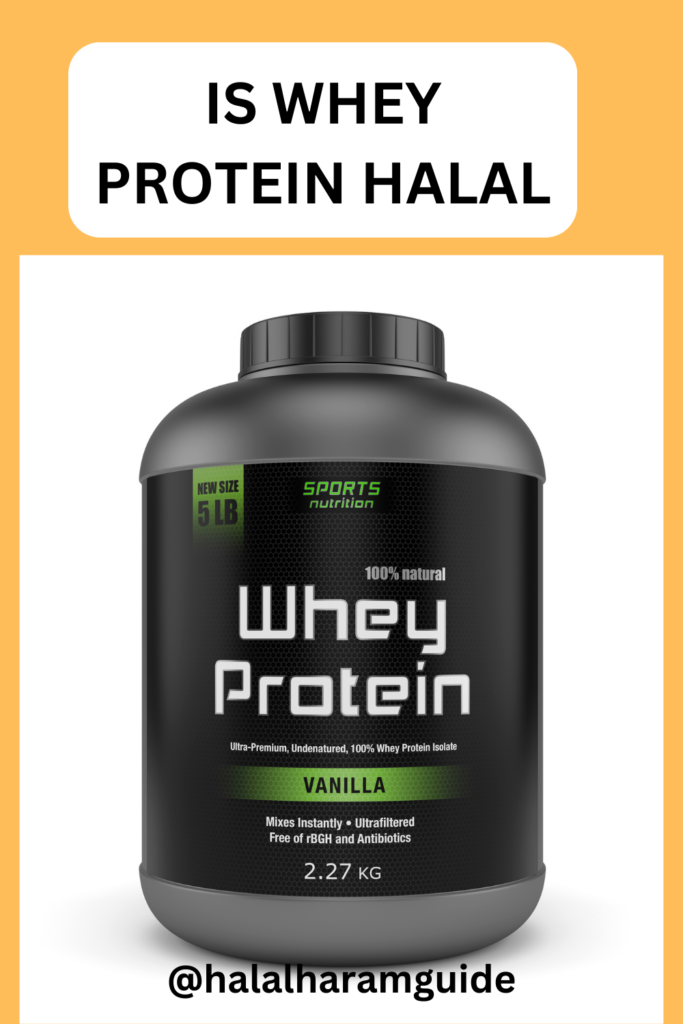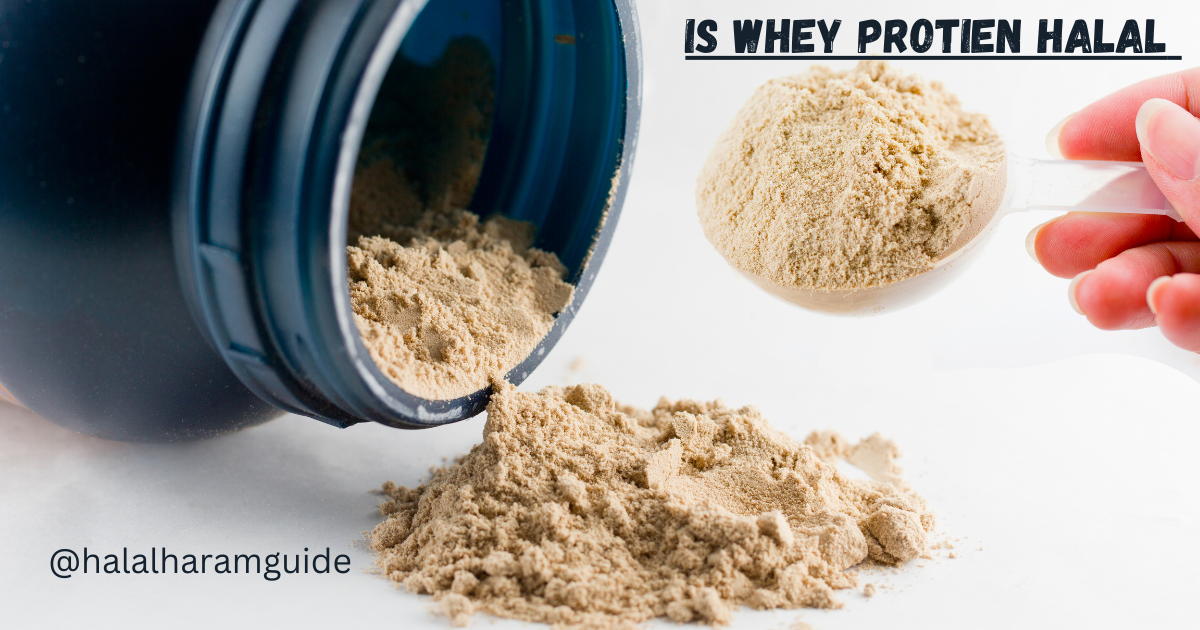In the realm of dietary choices, many individuals wonder, “Is whey protein halal?”
This question arises from the desire to maintain a diet that adheres to Islamic principles and guidelines. Whey protein, a widely popular dietary supplement, is known for its potential health benefits, particularly in the fitness and nutrition world.
However, when it comes to adhering to halal dietary practices, there may be uncertainties regarding the permissibility of consuming whey protein. In this blog post, we will delve into the halal status of whey protein, providing you with insights and information to make informed dietary decisions while adhering to your faith.
What Exactly Is Whey Protein?
Whey protein is a type of protein that is derived from milk. It is a high-quality and complete protein source, meaning it contains all the essential amino acids that the human body needs but cannot produce on its own. Whey protein is obtained during the cheese-making process, where milk is separated into two components: liquid whey and curds. The liquid whey is then processed and dried to create whey protein powder, which is commonly used as a dietary supplement.
Whey protein is well-known for its rapid absorption and digestibility, making it a popular choice among athletes, bodybuilders, and individuals seeking to increase their protein intake. It is often used in protein shakes, smoothies, and various food products to support muscle growth, recovery, and overall nutritional needs. Whey protein is available in different forms, including whey protein concentrate (WPC) and whey protein isolate (WPI), with varying protein concentrations and nutritional profiles.
Whey Protein Advantages
Whey protein offers several advantages, which make it a popular dietary supplement and protein source for many people. Here are some of the key advantages of whey protein:
High-Quality Protein: Whey protein is a complete protein, containing all essential amino acids that the body needs. This makes it an excellent source of high-quality protein, particularly valuable for muscle building, repair, and overall health.
Rapid Absorption: Whey protein is quickly digested and absorbed by the body, leading to a rapid increase in amino acids in the bloodstream. This makes it ideal for post-workout recovery when the body needs nutrients to repair and build muscles.
Rich in BCAAs: Whey protein is naturally rich in branched-chain amino acids (BCAAs), including leucine, isoleucine, and valine. BCAAs play a crucial role in muscle protein synthesis and can help promote muscle growth and reduce muscle soreness.
Low in Fat and Carbohydrates: Whey protein isolate (WPI) and whey protein hydrolysate (WPH) are low in fat and carbohydrates, making them suitable for those looking to increase protein intake without significantly affecting calorie or carbohydrate consumption.
Lactose Tolerance: Whey protein isolates have minimal lactose content and are generally well-tolerated by individuals with lactose intolerance.
Convenience: Whey protein supplements are convenient and portable, making it easy to meet protein needs on the go.
Types of Whey Protein
Whey protein is classified into two primary types based on the processing methods used to produce it. These two types are:
Whey Protein Concentrate (WPC):
WPC is one of the most common forms of whey protein. It is produced by taking liquid whey and removing some of the fats and carbohydrates while retaining most of the protein. WPC typically contains around 70-80% protein by weight, with the remaining content consisting of fats, carbohydrates (including lactose), and other nutrients. The exact composition can vary depending on the specific product. Because it retains some of the fats and carbohydrates, WPC may have a slightly creamier taste and texture compared to other forms of whey protein.
Whey Protein Isolate (WPI):
WPI is a more processed and refined form of whey protein. It undergoes additional filtration and processing to remove almost all of the fats and carbohydrates, including most of the lactose. As a result, WPI is a highly concentrated source of protein, typically containing 90% or more protein by weight. It is virtually lactose-free, making it a suitable option for individuals with lactose intolerance. WPI is often preferred by those looking for a protein source with minimal fats and carbohydrates and a higher protein content per serving.
Is Whey Protein Halal?
The halal status of whey protein depends on several factors, including the source of the whey and the processing methods used to produce it. Here are some key considerations regarding the halal status of whey protein:
Source of Whey: Whey protein is typically derived from milk, which is a halal source of protein as long as the milk comes from a halal animal (e.g., a cow that has been slaughtered in accordance with Islamic ritual slaughter). Therefore, if the whey protein is sourced from halal milk, it would generally be considered halal.
Processing Methods: The halal status of whey protein can also depend on the processing methods used. If the whey protein is produced using equipment and processes that are free from cross-contamination with non-halal substances or prohibited ingredients, it is more likely to be considered halal.
Additives and Flavorings: Some whey protein products may contain additives, flavorings, or other ingredients. These additional ingredients should also be halal, and they should not contain any haram (forbidden) substances.
Certification: In some cases, whey protein manufacturers seek halal certification from reputable halal certification authorities to confirm that their products meet halal standards. Halal certification provides assurance to consumers that the product complies with Islamic dietary laws.
Fatwas Regarding “Is Whey Protein Halal”
The permissibility of consuming whey protein, like other dietary matters, can vary based on individual interpretations and fatwas (religious rulings) issued by Islamic scholars. Since fatwas are often context-specific and can change over time, it’s essential to seek guidance from qualified religious authorities or scholars in your local community or region.
Local Scholars: Consult with knowledgeable local scholars or imams who are well-versed in Islamic jurisprudence (fiqh). They can provide guidance based on their understanding of Islamic dietary laws and their knowledge of the particular whey protein products available in your area.
Halal Certification Bodies: Many countries and regions have halal certification organizations that provide certification for various products, including whey protein. These organizations often have their own fatwas and guidelines regarding halal certification. You can check with these bodies for information on specific products.
Islamic Websites and Resources: Some reputable Islamic websites and organizations publish fatwas and guidelines on various topics, including dietary matters. These online resources may offer guidance on the halal status of common food and supplement products.
Local Islamic Centers: Local Islamic centers and mosques may offer educational programs or have scholars who can provide guidance on halal dietary practices.
Consult Multiple Sources: When seeking a fatwa or guidance on the halal status of whey protein, it’s advisable to consult multiple sources to ensure a well-informed decision. Different scholars or organizations may have varying opinions, and considering multiple perspectives can help you make an informed choice.
Is Animal Rennet Haram Or Halal?
The permissibility of animal rennet (enzymes derived from the stomach lining of animals) in Islamic dietary laws can be a topic of debate among scholars and within different schools of Islamic jurisprudence.
The key issue revolves around whether the animal from which the rennet is derived was slaughtered in accordance with Islamic ritual slaughter (zabiha or dhabiha) and whether the rennet undergoes significant chemical changes during the cheese-making process.
Alternatives For Halal Protein Powder
For individuals seeking alternatives to traditional whey or casein protein powders in accordance with halal dietary guidelines, there are several viable options available. One popular choice is plant-based protein powders, such as those made from pea protein, rice protein, hemp protein, or soy protein.
These plant-based options are typically considered halal, as they do not involve the use of animal-derived ingredients or enzymes, and they are free from concerns related to non-halal slaughter or animal-derived additives.
Additionally, some companies offer halal-certified protein powders, ensuring that the product complies with Islamic dietary laws and guidelines. These alternatives can provide a rich source of protein to support muscle growth, recovery, and overall nutritional needs while aligning with halal dietary principles.
1. Lactose-Free Whey Protein
Lactose-free whey protein is an ideal choice for individuals who are lactose intolerant but still want to benefit from whey protein’s high-quality amino acid profile. It is derived from whey but undergoes additional processing to remove most or all of the lactose, making it easier to digest for those with lactose sensitivity. This type of protein powder can provide the benefits of whey protein without the discomfort often associated with lactose consumption.
2. Zahlers Reach, Whey Protein Powder
Zahlers Reach is a brand that offers a variety of whey protein powder options. When choosing protein powder products, individuals concerned with halal dietary guidelines should check the ingredients and processing methods to ensure that they align with their dietary preferences. Some products may be suitable for halal dietary practices, while others may not meet those criteria. Zahlers Reach, like other reputable brands, may offer protein powders that cater to specific dietary needs.
3. Vega Plant-Based Protein Powder
Vega is known for its plant-based protein powder options, which are suitable for individuals following a vegan or vegetarian diet or those looking for plant-based protein sources. These powders are typically made from ingredients like pea protein, brown rice protein, hemp protein, and more. Vega’s plant-based protein powders are generally considered halal, as they do not contain animal-derived ingredients or additives, making them a viable option for individuals seeking protein supplements in accordance with halal dietary principles.
Conclusion:
In conclusion, the halal status of whey protein can be influenced by various factors, including the source of the whey, processing methods, and the opinions of different scholars and halal certification authorities.
While whey protein derived from halal sources and processed according to halal standards is generally considered permissible, it’s important for individuals seeking to follow halal dietary guidelines to exercise caution, read product labels, and seek guidance from knowledgeable religious authorities when in doubt.
Additionally, alternative protein sources, such as plant-based protein powders, can provide halal-friendly options for those looking to meet their protein needs while adhering to their dietary principles. Ultimately, making informed dietary choices is essential to ensure that one’s protein consumption aligns with their religious beliefs and values.
Frequently Asked Questions
Q1. Is It Ok To Consume Cultured Whey?
Consuming cultured whey, which is produced through fermentation processes, can be acceptable for vegetarians and those with specific dietary preferences. Cultured whey is often derived from dairy sources but may not involve the same ethical or religious concerns as traditional animal-derived whey. However, individuals with strict dietary requirements, such as vegans, should be aware that even cultured whey may have some connection to dairy. It’s advisable to check product labels and ingredient lists to ensure that the cultured whey aligns with one’s dietary choices and principles.
Q2. What Constitutes Whey?
Whey is a liquid byproduct that is obtained during the cheese-making process. It is separated from the solid curds and primarily consists of water, proteins, fats, and lactose. The proteins in whey are what make it a valuable source of nutrition, particularly for its high-quality amino acid content. These proteins can be processed further to create various forms of whey protein powder, including whey protein concentrate (WPC) and whey protein isolate (WPI).
Q3. Are All Whey Protein Products Vegetarian?
Not all whey protein products are vegetarian. Traditional whey protein, obtained from the cheese-making process, is derived from dairy sources and is not considered vegetarian. However, some whey protein products, such as those labeled as “vegetarian whey protein” or “plant-based whey protein,” are formulated without animal-derived ingredients. These products are suitable for vegetarians and those looking for plant-based protein sources. It’s essential to read product labels and ingredient lists to determine whether a specific whey protein product aligns with vegetarian dietary preferences.
- “Is Lobster Halal? Understanding Its Permissibility”
- “Is Drawing Haram in Islam? Understanding the Perspective”
- “Is Fermented Kimchi Halal? Exploring Kimchi’s Halal Status”
- “Is Collagen Halal? Unveiling the Halal Status of Collagen”
- “Is Wine Vinegar Halal? Unveiling Its Permissibility”


